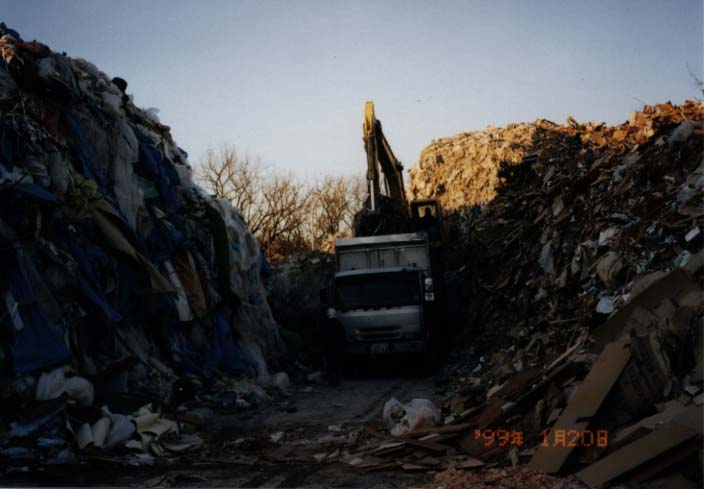
Violations of Storage Regulations
Stronger storage regulations were passed in April 1999, nevertheless,
the size of the mountains of refuse in the Tokorozawa area has
not decreased one bit. The prefecture government has made no
move to repeal permits of those commercial incinerator operators
who have ignored injunctions made against them under the new regulation.
The prefecture governments method for dealing with flagrant offenders
is to offer repeated guidance.
A mountain of refuse accumulated over many years. In fact,
it has taken over the entire grounds. Mountains of refuse are
known firetraps, and when they burn, become serious environmental
hazards.
If non-porous sheeting has not been laid beneath the storage facility,
then these operators are in violation of the new regulations.
Rainwater leaching down through the refuse can carry dangerous
substances through the layers of earth to the ground water. The
myriad materials which comprise the refuse pile include waste
plastics which have darkened in color over the years, leaching
out substances which may be polluting the environs. Clean-up procedures
could cost in the hundreds of millions of yen.

13. The Nagashima Works (permit to burn waste plastics, permit
for interim storage of waste plastics, wood chips, metal shreds,
glass and ceramic rubble, construction wastes.)
The mountain, which appeared around 10 years ago, is comprised
of mixed wastes and rises at least 10 meters high. In October
1996, Nagashima was sited by the authorities for storage violations
and ordered to comply with regulations. Nagashima has not complied,
and is now in violation of the order. However, the prefecture
authorities, in lieu of enforcing the order, have chosen to repeatedly
offer “guidance”. Incinerator operations ceased after a fire outbreak
in April 1997. In Nov. 1999, the interim storage permit expired.
The permit for collection and transport of wastes expired Oct.16,
1999. Why is the mountain of waste still there?


Ā@14. Oozora (Big Sky) Recycling Center. Refuse piles take up most
of the grounds, and overflow onto the surrounding land. A plastic
sheet is the only barrier between the incinerator area and the
surrounding land, increasing the hazard for fire.

Musashino, Inc. A ten-meter high mountain of mixed wastes. Citizens have witnessed operators mixing incinerator ash in with the wastes. Starting in March 1997 the prefecture issued repeated letters of “advise”. In March 1998, the prefecture issued an order to comply with storage regulations. The mountain of wastes remains unchanged, and the prefecture shows no sign of bringing formal charges against Musashino for violations of the order.